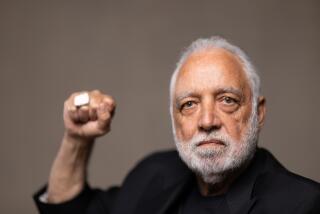Obituaries - Aug. 26, 1999
- Share via
Leo Arkfeld; ‘Flying Bishop’ of New Guinea
Leo Arkfeld, 87, who was known as “the flying bishop of New Guinea.” Born in Nebraska, reared in Iowa and educated in Illinois, the Catholic priest after World War II went to New Guinea, where the Japanese had destroyed the island’s Mission of the Divine Word. He learned to fly shortly afterward and piloted his own small planes for decades throughout his 300-by-200-mile jungle parish. Arkfeld was ordained a priest in 1943 and became a bishop four years later, at age 36 one of the youngest Catholic bishops in the world. He supervised more than two dozen priests and flew to visit their more than 30 mission stations, commenting in 1955: “The forest is roadless and almost trailless. Even where there are bush paths you can walk for days and only occasionally come to tiny forest clearings. It would be all but impossible to do much work under those circumstances.” His brother, George Arkfeld of Pasadena, said the bishop had retired from his flying ministry only recently. On Saturday in Papua, New Guinea.
*
* Keith Banwell; WWII British Officer, Escape Artist
Keith D. “Tex” Banwell, 80, British Army officer who twice faced Gestapo firing squads and became known as an escape artist and a daredevil in World War II. Banwell was first captured during a raid on Tobruk, Libya, and escaped in a stolen vehicle. He was imprisoned again in Crete and escaped in a stolen landing craft. While recovering from injuries in a British hospital, he was enlisted as a look-alike double for Field Marshal Bernard Montgomery, who led British troops to victory in North Africa. He traveled around the Middle East, confusing the enemy about Montgomery’s whereabouts, but became bored with the assignment and returned to the infantry. He was captured again after parachuting into the Netherlands, but escaped by jumping from a moving train as it entered Germany. Banwell joined the Dutch Resistance and was captured again by Germans, who put him before a firing squad two times, threatening death unless he revealed names of Resistance leaders. Refusing, he was not shot but sent to Auschwitz and confined to a tiny cage. When the camp was liberated, he rejoined a British paratroop unit. After the war, Banwell worked for the British postal service. On July 25 in London.
*
* Irwin Safchik; Former News Editor for NBC
Irwin Safchik, 72, former news editor of NBC’s trend-setting “Huntley-Brinkley Report” of the 1960s and later a Los Angeles television producer. Known as a hard-edged newsman who resisted TV’s move toward fluffy features, Safchik began his career with the old International News Service during World War II. He moved into television news in its infancy and earned kudos for his work with Chet Huntley and David Brinkley. Later, Safchik served as executive news producer and then news director at KNBC-TV Channel 4. Fired in 1980 for his adherence to traditional news stories rather than lighter fare, Safchik went to Channel 2, now KCBS-TV, as news producer. Later, he also produced segments for NBC news magazine shows. He taught broadcast classes at USC and Cal State Northridge and ran the news operation for KCSN-FM (88.5), the school’s student station. For the NBC network and KNBC, Safchik directed crews covering 14 national political conventions, the assassination of President John F. Kennedy and civil rights protests. On Wednesday in Sherman Oaks, of cancer.
*
* Emil Tsipan; U.S. Jew Kept for Years in Soviet Union
Emil Tsipan, 75, a Los Angeles native who spent most of his life in the Soviet Union and became known as a refusenik when he was prevented from returning to California. The child of Ukrainian-born Jews, Tsipan was taken to Kiev at age 12 by his homesick parents. They died by the time he was 20, and he worked as an English teacher in Kiev and as an interpreter in Moscow. But as an American-born Jew, he was precluded from becoming a professor or otherwise advancing in his career. When his grown son faced the same discrimination, Tsipan resolved to take his entire family--wife, son, daughter, their spouses and two children--home to America. The effort took so many years that American Jewish groups cited him as a refusenik, a Jew kept in the Soviet Union against his will. In 1990, Tsipan was finally allowed to move his family to California. On Thursday in Santa Rosa, Calif.
More to Read
Sign up for Essential California
The most important California stories and recommendations in your inbox every morning.
You may occasionally receive promotional content from the Los Angeles Times.













